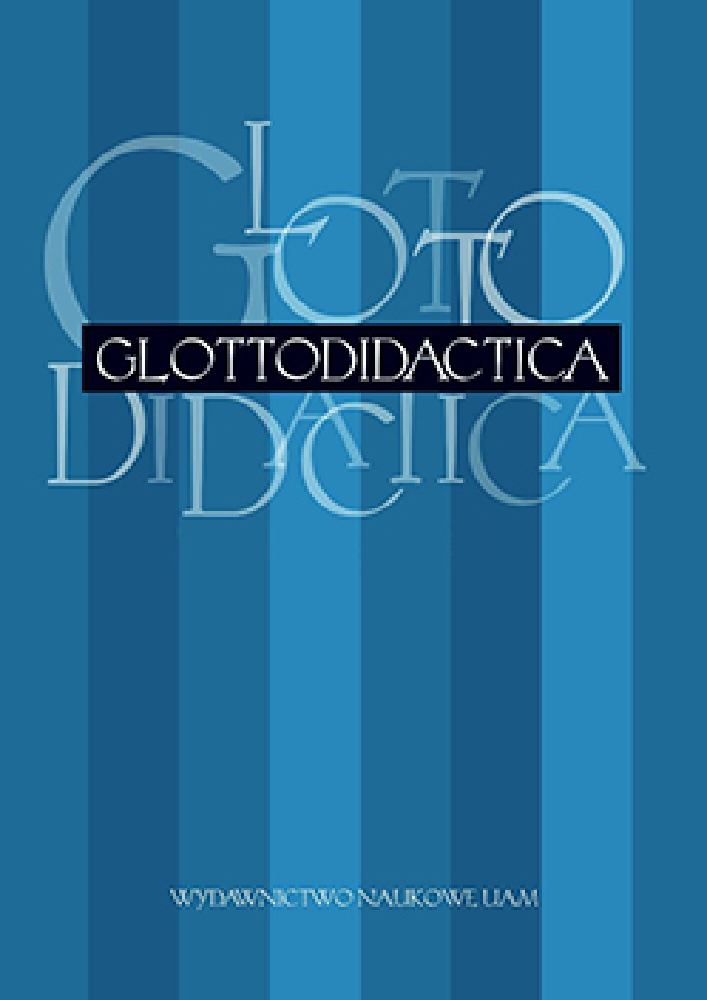Résumé
The research concerns a specific learning environment, namely the Institute of Romance Studies at the University of Wrocław, and attempts to address two questions: 1. To what extent do students of French philology currently benefit from the affordances offered to them by modern digital tools, in particular the various video-on-demand platforms, for informal learning of French via French-language films and series? 2. How does this activity stimulate their metacognitive awareness and self-awareness in the area of learning French as a foreign language? To this end, students of French philology took part in a survey which demonstrated that films and series are an important leisure activity, even if French-language titles represent only 21% of what they are watching. However, these films and series are subjected to important metacognitive reflection.
Références
Benson, P. (2011). Language learning and teaching beyond the classroom : An introduction to the field. In : P. Benson / H. Reinders (éds.), Beyond the language classroom(pp. 7-16).London : Palgrave Macmillan, https://doi.org/10.1057/9780230306790_2.
Csikszentmihályi, M. (2008, 1ère éd. 1990). Flow: The Psychology of Optimal Experience. New York : Harper Collins.
Dressman, M. (2020). Multimodality and Language Learning. In :M. Dressman & R.W. Sadler (éds.), The Handbook of Informal Language Learning (pp. 39-55), Hoboken, NJ: Wiley Blackwell.
Gibson, J. J. (1979). The Ecological Approach to Visual Perception. Boston : Houghton Mifflin.
Grabowska, M./ Zapłotna, A. (2021, à paraître). Samoświadomość metakognitywna w kształceniu sprawności pisania na studiach neofilologicznych na przykładzie italianistyki Uniwersytetu Wrocławskiego. Neofilolog.
Kramsch, C. (éd.) (2002). Language Acquisition and Socialization : Ecological Perspectives. Continuum : London et al.
Larsen-Freeman, D./ Cameron, L. (2008).Complex Systems and Applied Linguistics. Oxford : Oxford University Press.
Lier van, L. (2004). The Ecology and Semiotics of Language Learning : A Sociocultural Perspective. Boston : Kluwer Academic Publishers.
Pike, K.L. (1967). Language in Relation to a Unified Theory of Structure of Human Behavior. La Haye : Mouton.
Prensky, M. (2001a). Digital Natives, Digital Immigrants. On the Horizon, 9 (5).https://www.marcprensky.com.
Prensky, M. (2001b). Digital Natives, Digital Immigrants, Part II: Do They Really Think Differently? On the Horizon, 9 (6).https://www.marcprensky.com.
Schugurensky, D. (2007). « Vingt mille lieues sous les mers » : les quatre défis de l’apprentissage informel. Revue française de pédagogie. Recherches en éducation, 160, 13-27.https://doi.org/10.4000/rfp.583.
Schugurensky, D. (2000). The Forms of Informal Learning: Towards a Conceptualization of the Field. WALL Working Papers,19, 1-7.
Sockett, G. (2015). La prise en compte des apprentissages informels en didactique des langues étrangères.Mélangues CRAPEL, 36, 127-136.
Sockett, G. (2014). The Online Informal Learning of English. Houndmills, Basingstoke : Palgrave Macmillan.
Sockett, G., (2012). Le web social – La complexité au service de l’apprentissage informel de l’anglais, Alsic,15 (2).https://doi.org/10.4000/alsic.2505.
Sockett, G. (2011). Les processus cognitifs de résolution de problèmes pour l’apprentissage des langues dans des environnements multimédia : Apprentissage informel et réseaux sociaux. Les Cahiers de l'Acedle, 8(1), 1-11.https://doi.org/10.4000/rdlc.2237.
Sockett, G. / Kusyk, M., (2015). Online informal learning of English: frequency effects in the uptake of chunks of language from participation in web-based activities. In : T. Cadierno / S. W. Eskildsen (éds.), Usage-Based Perspectives on Second Language Learning. Berlin et al. : De Gruyter Mouton, 153-178. https://doi.org/10.1515/9783110378528-009.
Sockett, G. / Kusyk, M., (2013). L’apprentissage informel en ligne : nouvelle donne pour l’enseignement-apprentissage de l’anglais. Cahiers de l'Apliut, XXXII(1), 75-91. https://doi.org/10.4000/apliut.3578.
Toffoli, D./ Sockett, G. (2010). How non-specialist students of English practice informal learning using web 2.0 tools, Asp,58, 125-144, https://doi.org/10.4000/asp.1851.
Zając, J. (2009). Znaczenie metapoznania w rozwijaniu kompetencji uczenia się języka obcego. Scripta Neophilologica Posnaniensia, X, 175-184.
Licence
 This work is licensed under a Creative Commons Attribution-NoDerivatives 4.0 International License.
This work is licensed under a Creative Commons Attribution-NoDerivatives 4.0 International License.
Authors
Authors of texts accepted for publication in Glottodidactica are required to complete, sign and return to the Editorial team’s office the Agreement for granting a royalty-free license to works with a commitment to grant a CC sub-license.
Under the agreement, the authors of the texts published in Glottodidactica grant Adam Mickiewicz University in Poznań a non-exclusive, royalty-free license and authorize the use of Attribution-NoDerivatives 4.0 International (CC BY-ND 4.0) Creative Commons sub-license.
The authors retain the right to the free disposal of the work.
Users
Interested Internet users are entitled to use works that have been published in Glottodidactica since 2016, under the following conditions:
▪ attribution – obligation to provide, together with the distributed work, information about the authorship, title, source (link to the original work, DOI) and the license itself.
▪ no derivatives – the work must be preserved in its original form. Without the author's consent, it is not possible to distribute the modified work in the form of translations, publications, etc.
Copyrights are reserved for all texts published before 2016.
Miscellaneous
Adam Mickiewicz University in Poznań retains the property right as a whole (layout, graphic form, title, cover design, logo etc.).
Privacy statement
The names and email addresses published on this journal site will be used exclusively for the purposes declared by this journal and cannot be used for any other purpose or by any other party.





